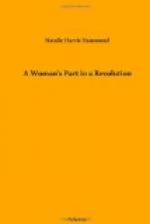The night following the sentence, Mr. Chapin, the U.S. Consul, and his wife came to me. They were then and for months afterwards as tender and faithful as people of my own kindred. Mr. Chapin was tireless in his efforts in behalf of the Americans in trouble, and the high personal regard in which he was held by the Boer, as well as Uitlander, did much subsequently to ameliorate their circumstances. Mr. Chapin at once interviewed Mr. Wessels, chief advocate for the Reformers—and he told me immediately after the interview the result of their meeting. Mr. Wessels distinctly said that, although it was not put in writing, it was understood between the State Attorney and himself ‘as between man and man’ that if the prisoners pleaded guilty he would not press for severe punishment. (Mr. Wessels has since, for reasons only known to himself, denied this both privately and publicly.)
APRIL 29.—The commutation was published. Mrs. George Farrar had come from Johannesburg, and together we went to see our husbands. Our visit was limited to five minutes. We found the four men haggard, but apparently cheerful. The condemned cell had an earthen floor. It had been newly whitewashed and reeked of antiseptics. Four canvas stretchers, a tin pail filled with water, and a dipper, furnished it. A negro murderer had been its last occupant. I sat on one of the canvas cots with an arm around my husband and holding Colonel Rhodes’ hand. Mrs. Farrar was sitting on the opposite cot, locked in her husband’s embrace. The guard came to order us out. Poor Mrs. Farrar looked so frail and white, I put my arm about her to give her support. In the courtyard we stopped to speak to one of the Reformers. The guard became furious, and, swinging his arms in a threatening manner, rushed at us with curses. We were driven violently out of the yard like depredating dogs. Surely the sun never looked upon two women in sadder case. She was just up from her confinement, and I was far advanced in pregnancy.
XII
No cable of political purport could be sent from Pretoria safe from mutilation. I therefore despatched Mr. Hammond’s secretary to Cape Town with a message to the American press, reporting Mr. Wessels’ plea for the Reformers, the statement of the four leaders, and the sentence. I did this, believing that, if the American public fully understood the circumstances of the case, popular sympathy would allow no stone to remain unturned to protect their unfortunate countryman from so violent and unjust a sentence.
Pretoria seethed with overwrought wives. In the prison the men were suffering real hardship. The sanitary arrangements were shocking. Twenty-two Reformers were crowded into a room thirty feet by ten. This room had been hastily built of corrugated iron, and leaked at every seam. Draughts were strong enough to blow the hair about their temples; the men slept on straw mattresses laid on the floor, and there




